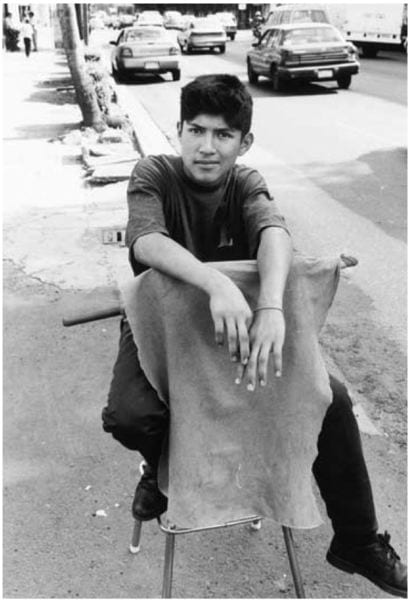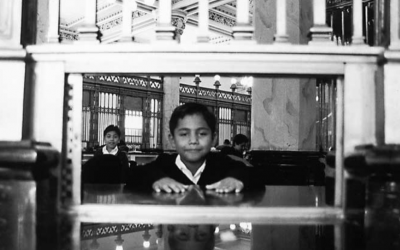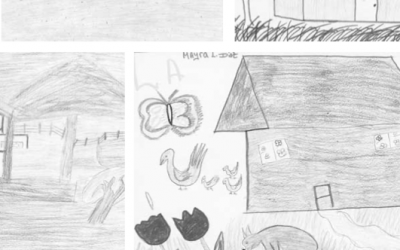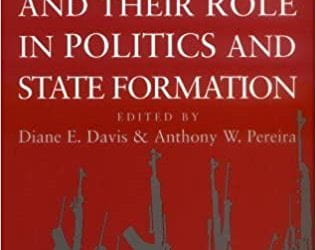Teen Life
In Latin America and the Caribbean

A boy parks cars in Mexico City. Photo by Carin Zissis
What is life like for teens in Latin America and the Caribbean? That’s a question I set out to answer when I was approached by Greenwood Press to co-edit Teen Life in Latin America and the Caribbean, with Kristen Sternberg [Connecticut: Greenwood Press, forthcoming Spring 2004].
I was not only concerned with understanding Latin teens, but also with promoting, through the book a better understanding between teens in the United States and their counterparts. In fact, the pen pal addresses included at the end of each chapter would actually allow them to interact.
One of the things Kristen and I quickly discovered is—that with the exception of English speaking countries in the Caribbean—the term “teen” is meaningless in the region. The differences are those of class and community, not necessarily those of age. Overarching factors such as social class and ethnicity are set against the increasing impact of globalization and Neoliberal policies.
We take a look at teens in Argentina, Brazil, Colombia, Cuba, Chile, Dominican Republic, Ecuador, El Salvador, Guatemala, Haiti, Jamaica, Mexico, Peru, Puerto Rico and Venezuela. “Teens at the Border: for a Politics of Representation,” is an adaptation (and my translation) of an article by Mexican researcher Rossana Reguillo Cruz, one of a very few to show a focused agenda on youth culture in the region. Reguillo Cruz examines issues of migration arising from the State’s failure to meet basic needs such as health care and education. Against the backdrop of a deepening socioeconomic crisis, the vacuum left by family, school and Church increases the difficulty of integration. Deprived of the opportunity to either work or study, some turn to drug trafficking. However, they face police brutality. Youths bond by looking for transcendental meaning in new religious movements, such as Mexican “Raztecas” (Raztecs) and Puerto Rican “rastainos.” The market, organized around styles such as Punk, Surf, Sport, Rastafarian, Neo-Hippie, Rap and Heavy Metal offers a chance to belong. Gangs, however, serve the same purpose. Reguillo Cruz concludes with a call to action, demanding urgent attention to the predicament of teens.
Topics about teenage life—typical day, family life, traditional and non-traditional food dishes, schooling, social life, recreation, entertainment, religious practices and cultural ceremonies—try to find common threads among teenage life, even if teenage life is a somewhat misleading construct in Latin America and the Caribbean. We also included a list of resources to give the book more relevance. We organized the structure of the book to facilitate comparisons, but had most authors write about their countries of origin. We included interviews with teens of the respective countries. Though all contributors address culture/ ethnicity, race, class, and gender issues, some like Jason Pribilsky, focus primarily on the daily lives of indigenous teens in Ecuador. Others, such as Aída Pierini and Gustavo Geirola, who write about Argentina, stress paradigmatic differences. They argue that if teens in the 1960’s were anti-American, anti-capitalist, socialist and committed to solidarity, today’s teens are defined by pro-Americanism, capitalism, efficiency, individualism and personal success.
Given the paucity of resources in the market, Teen Life in Latin America and the Caribbean meets a dire need. As an Argentine, I strongly believed in the need to include the views of a Latin American researcher, therefore, I am deeply grateful to Rossana Reguillo Cruz for having granted permission to include an adaptation of her work.
Winter 2004, Volume III, Number 2
Cynthia Margarita Tompkins is an Associate Professor of Spanish and Women’s Studies at Arizona State University.
Related Articles
Editor’s Letter: The Children
A blue whale spurts water joyfully into an Andean sky on my office door. A rainbow glitters among a feast of animals and palm trees. Geometrical lightning tosses tiny houses into the air with the force of a tropical hurricane.
Centroamerica
Cuando Pedro Pirir, fue despedido del taller mecánico donde trabajaba desde hacía muchos años, experimentó una sensación de injusticia y pena que luego se transformó en una voluntad…
Irregular Armed Forces and their Role in Politics and State Formation
As I sat in heavy traffic in the back of a police car during rush hour in the grimy northern zone of Rio de Janeiro, I studied the faces of drivers in neighboring cars, wondering what they thought of…




